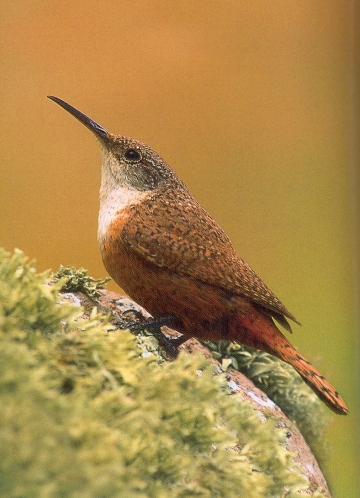|
Medium wren
with rust-brown upperparts, fine white spots on gray-brown back, nape,
and crown, white throat and breast, and white-spotted brown belly. Tail
is long and brown with thin black bars. Head has a flattened appearance;
bill is long, slender, and slightly decurved.
|
CANYON
WREN
Catherpes mexicanus
PASSERIFORMES
Wrens (Troglodytidae)
Range and Habitat
Resident from southern British Columbia southward through Pacific and
Mountain states to Baja California and much of the Mexican interior,
eastward to southwestern South Dakota and central Texas. Preferred habitats
include cliffs, canyons, rocky outcrops, and boulder piles.
SOUND:
"peup, peup, peup tew tew tew tew tew mew", "jeet"
The Canyon Wren is not known to drink water.
It probably gets all the water it needs from its insect prey. It has
been seen foraging along the sides of desert springs, but not drinking.
Its long bill and flat head enable it to reach deep into crevices to
find prey.
A group of wrens has many collective nouns, including a "chime",
"flight", "flock", and "herd" of wrens.
The Canyon
Wren is a bird species that is native to the United States, Mexico and
Canada. This bird has a range of more than 4 million kilometers.

|